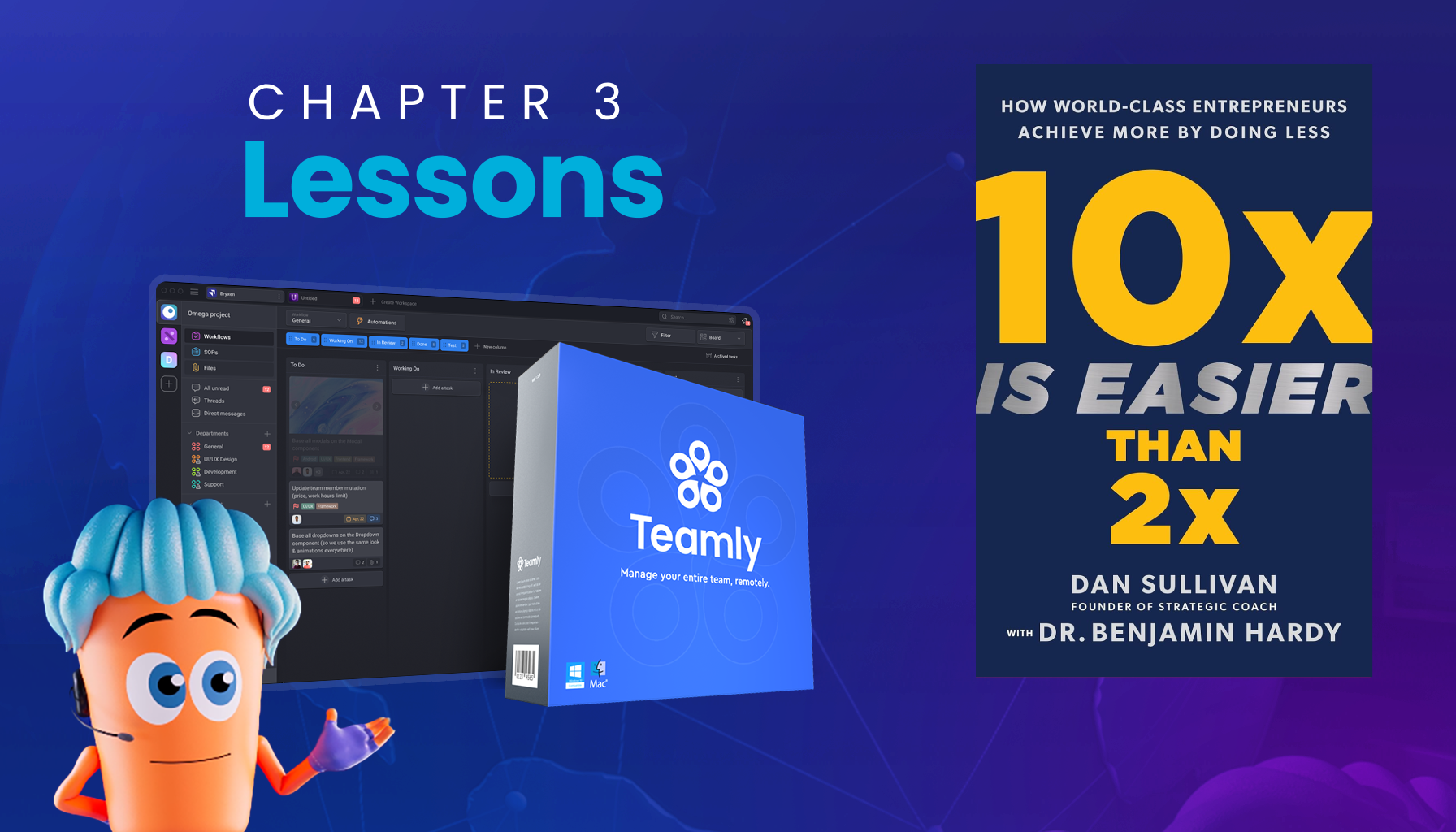
Click the button to start reading
Long-Term Goals for Work: Why They Matter (With 45+ Examples)
No matter where you are in your career journey—whether you’re stepping into your first job post-graduation or have been loyal to the same company for years—setting long-term goals is central to growth. Ambitions can give your career purpose and guidance.
When we think over goals, our minds often gravitate towards the immediate: the tasks on our plate or the projects for the upcoming quarter. However, integrating a long-term vision into our professional journey can be transformative. It instills ambition, fuels determination, and sharpens our focus.
In contrast, neglecting long-term planning can lead to a sense of stagnation.
Many find themselves at drift and stuck in roles they’ve outgrown, a situation intensified by family, hobbies, and life’s many responsibilities. Yet, with a clear roadmap, careers become more purposeful through life’s bumps and bruises.
In this article, we deliver a guide on long-term goals, including how to create intentional goals, their impact on you as a person and your career, and detailed examples of long-term goals for all types of people.

Long-Term Goals in the Workplace and How They Work
At the heart of every ambitious professional’s journey lies a set of long-term goals.
But what these goals look like could vastly differ from individual to individual. Everyone has a different idea of what success could be and how they want their career to factor into their lives.
For some, it could be the deeply ambitious goal of becoming a CEO or floating a company on the stock exchange. For others, it could be about balancing work and family. Or it could be to do more humanitarian work.
There’s no right or wrong answer when setting long-term goals at work. However, they can be vastly different from the daily goals we set ourselves.
Long-term goals can be defined as the sweeping objectives that individuals aim to achieve over an extended period, typically spanning several years or even decades.
They are not just fleeting desires or whims; they are deeply rooted aspirations that provide direction and purpose to our professional lives. Long-term goals are a commitment that could see us return to school, pivot into new roles, and take on new challenges.
Several characteristics set long-term goals apart from more immediate ones:
- Persistence: They remain consistent over time, even as short-term objectives may change.
- Clarity: They provide a clear picture of the desired outcome, even if the path to get there might be uncertain.
- Motivational: They serve as a source of inspiration, driving individuals to push boundaries and overcome challenges.
Think of short-term tasks as the stepping stones or the daily to-dos that lead toward achieving the bigger picture.
For instance, if one’s long-term goal is to become a department head, short-term tasks include taking on more significant projects, enrolling in leadership training, or networking with senior management. These tasks are immediate and often have a clear deadline.
In contrast, long-term aspirations, like becoming a leader in one’s field, require a combination of these short-term tasks: continuous learning, adaptability, and patience. They’re not achieved overnight but culminate years of dedication and hard work.

The Impact of Long-Term Goals on Career Development
Career development is one of the singular most important undertakings a person has. Most people work for more than 40 years, spending at least 40 hours each week in the office, the warehouse, or the work site.
We must turn to work for more than just financial security; it must provide satisfaction, a sense of purpose, and opportunities for personal growth and fulfillment. It’s here that long-term goals really come into play.
Not every job will deliver exactly what we need, and as is human nature, our desires may change. Long-term goals help us to work towards our professional wants and needs and ensure we’re always moving in a direction that aligns with our broader ambitions.
Here are a few of the ways long-term goals for work do just that:
Direction and Clarity
Career development without clear long-term goals can feel directionless. Just as we need a plan when embarking on a new project or task, our careers also benefit from a structured approach.
Without these goals, we might find ourselves in roles that don’t leverage our strengths or passions.
Long-term goals provide clarity, ensuring that our professional decisions, from courses to job changes, align with our broader aspirations and vision for the future.
Motivation and Commitment
Setting ambitious long-term goals can also be a powerful catalyst for motivation.
When we have a clear vision of what we want to achieve, the challenges faced along the way become less of obstacles and more of learning opportunities. These goals remind us of the bigger picture, especially during times of doubt or when faced with mundane tasks.
Committing to a long-term goal can turn mundane tasks into meaningful steps toward that goal. It’s the difference between seeing a task as “just another report to file” and “a step closer to my aspiration of becoming the best analyst in the industry.”
Long-term goals are more than wishful thinking.
While short-term tasks give us immediate direction and satisfaction, long-term goals shape our career objectives over time.

Crafting Meaningful Long-Term Goals
Crafting long-term goals isn’t a task to be taken lightly.
These aspirations will guide your actions, decisions, and growth for years to come. But how does one go about setting these pivotal objectives?
It’s a blend of introspection, diligent research, and seeking wisdom from those who’ve walked the path before.
Now, let’s take a look at how you can start ruminating on what your long-term goals should be.
Self-Reflection
The journey to meaningful long-term goals begins inward.
Take a step back and engage in some honest self-reflection.
- What truly drives you?
- Where do your passions lie?
- What legacy do you want to leave in your field?
- How should your work-life balance be in the future?
- What challenges are you willing to face and overcome?
- Which achievements would make you look back with pride?
- How do external factors, like family or location, influence your goals?
- How do your personal values align with your professional aspirations?
Understanding your strengths can give you a clear indication of where you can shine in your career.
Conversely, recognizing your weaknesses isn’t a moment of self-doubt but an opportunity to identify growth areas.
Since your career will always be an important part of your life, long-term goals for work should align closely with your personal values where possible. After all, professional success is most fulfilling when it resonates with personal values and desires.
Research
Once you have a clearer understanding of your personal landscape, it’s time to look outward.
The professional world is constantly in flux and flow, with industries evolving, new ones emerging, and some becoming obsolete.
Anyone planning for the long term should study these trends.
Let’s use the tech industry as an example. If you’re building a career, understanding the rise of AI or quantum computing might influence your long-term goals.
Aligning your aspirations with market demands ensures that your goals are personally fulfilling and professionally relevant. This alignment can be the difference between striving in an oversaturated market and pioneering in a burgeoning field.
Consultation
There’s a saying that resonates with career goals: “No man is an island.”
Despite being personal, crafting long-term goals should be a collaborative endeavor. Seeking mentorship can make a world of difference.
With their wealth of experience, mentors can provide insights you might have yet to consider. They can challenge your perspectives, refine your goals, and even provide resources to help you achieve them.
With that said, feedback isn’t limited to mentors.
Colleagues, peers, or even friends in the same industry can offer a fresh perspective. They can point out potential pitfalls or offer suggestions that make your goals more attainable and meaningful.
You may already have someone in mind:
- A boss.
- A thought leader from Twitter.
- A local business owner.
- A friend who’s set up their own business.
There’s never any harm in asking for advice.

Long-Term Goals Examples for Work
If you’re reading this and not yet sure what your long-term goals should be, that’s good. It should be a challenging question to answer.
To help you out, we’ve put together an extensive list of long-term goals for work that you can consider. It would be best if you didn’t take on too many long-term goals that giving them proper attention is impossible.
Opting for more than one is excellent, but goals, regardless of how ambitious, need to be attainable. So, with that out of the way, here are some examples of long-term goals in the workplace:
Leadership Aspirations:
Leadership aspirations refer to the desire to climb the corporate ladder, not just for the sake of power or a higher paycheck, but to make a meaningful impact, guide teams, and influence organizational direction.
- Leading a cross-functional team or heading a new department.
- Spearheading a major project that brings innovation to the company.
- Progressing from an entry-level position to a managerial or executive role.
- Becoming a mentor or coach to younger employees, guiding them towards their own leadership paths.
Skill Development:
Skill development is the continuous enhancement of one’s abilities to stay relevant, competitive, and adaptable in your industry to remain irreplaceable at work (great for negotiating pay rates!). There are always skill gaps to be filled, and if you can recognize and plan for them, you’ll be a more valuable asset.
- Mastering a new software or technology relevant to the industry.
- Obtaining a higher degree or certification to specialize in a niche area.
- Learning a new language to expand business in non-English speaking regions.
- Attend workshops or seminars to stay updated with industry trends and best practices.
- Engaging in hands-on projects or collaborations to apply and test new skills in real-world scenarios.
Industry Transition:
Industry transition is about adapting one’s skills and experiences to thrive in a completely different sector or role. It’s a bold move, often driven by a desire for new challenges, better opportunities, or personal passion.
- Moving from one sector to another, e.g., from finance to tech.
- Pivoting from a technical role to a client-facing or sales role.
- Transitioning from a corporate setting to a startup environment or vice versa.
- Exploring roles in emerging industries or sectors that align with one’s values and passions.
- Using skills from a previous position to address gaps or bring fresh perspectives in a new industry.
Networking:
Networking is where you’ll engage in building and nurturing professional relationships. It goes beyond just adding connections on LinkedIn or handing out business cards at an event; networking is an intentional choice to forge mutual relationships with industry experts and peers who can offer insights, opportunities, and support
- Participating in community service or volunteer work related to one’s profession.
- Joining or leading industry associations or groups to stay updated and connected.
- Attending conferences, seminars, and workshops to meet like-minded professionals.
- Organizing or attending local meetups or networking events to foster community ties.
Personal Branding:
Personal branding is about developing yourself as an expert in your industry. It’s the impression people have of you based on your expertise, actions, and online presence. Good personal branding can lead to speaking engagements, books, and other opportunities reserved for the best of the best.
- Establishing oneself as a thought leader or expert in a specific domain.
- Speaking at industry events or guest lecturing at educational institutions.
- Launching a personal blog, podcast, or YouTube channel related to professional expertise.
- Engaging actively on professional social media platforms, sharing insights, and joining discussions.
Work-Life Balance:
Work-life balance is the equilibrium between one’s professional responsibilities and personal life. Work doesn’t overshadow other important aspects of life like family, hobbies, and self-care. Achieving this balance can increase productivity and improve mental well-being and job satisfaction.
- Prioritizing time for hobbies, relaxation, and spending time with loved ones.
- Setting boundaries by unplugging from work emails or calls during off-hours.
- A four-day workweek or flexible working hours to accommodate personal commitments.
Financial Goals:
Financial goals are the monetary objectives one sets for one’s professional journey. These can range from short-term targets like saving for a vacation to long-term aspirations like retirement planning.
- Investing in assets like property or stocks to grow wealth.
- Aiming for a specific salary bracket to meet lifestyle aspirations.
- Saving a certain amount for retirement to ensure a comfortable post-work life.
Mentorship:
Mentorship is a relationship in which a more experienced individual guides a less experienced person in their professional journey. It’s a two-way street where the mentor and mentee can learn and grow.
- Seeking a mentor in a desired field or position to gain insights and advice.
- Participating in formal mentorship programs offered by organizations or institutions.
- Taking a certain number of professionals or students under one’s wing and guiding them.
- Sharing experiences and lessons learned through seminars, workshops, or online platforms.
Entrepreneurial Goals:
Entrepreneurial goals revolve around the ambition to create, manage, and grow a business. Whether it’s a passion project on the side or a full-blown startup, these goals can be both financially driven or based on personal values and desires to make a difference.
- Seeking partnerships or collaborations to expand business reach and offerings.
- Starting a side business or transitioning to full-time entrepreneurship to pursue a passion.
- Scaling a startup to reach a specific revenue or user base milestone, ensuring business growth and sustainability.
Sustainability Goals:
Sustainability goals focus on the long-term well-being of the environment, society, and the economy. For professionals, this means integrating sustainable practices into their work, advocating for green initiatives, and ensuring that their actions positively impact the world.
- Spearheading green initiatives within the organization, promoting eco-friendly practices and solutions.
- Advocating for the adoption of renewable energy sources or waste reduction measures in the workplace.
- Reducing the company’s carbon footprint by a specific percentage, aiming for a more sustainable operational model.
- Collaborating with NGOs or community groups on projects that promote environmental conservation and awareness.
- Participating in corporate social responsibility (CSR) initiatives, aligning business practices with societal needs and expectations.
Innovation and Creativity:
Embracing innovation and creativity means constantly seeking new ways to improve, differentiate, and lead in one’s field. It’s about pushing boundaries and challenging the status quo. You might have identified ways to save money or new areas to expand into; being innovative can lead to making a name for yourself.
- Filing for patents to protect and capitalize on unique inventions or ideas.
- Participating in or hosting hackathons to solve industry-specific challenges.
- Leading brainstorming sessions or innovation hubs, creating spaces where ideas can flourish and evolve.
Continuous Learning:
Continuous learning may involve going back to college and studying for a master’s or MBA, but it doesn’t have to mean a return to formal education. In reality, a wide range of activities contribute to personal and professional growth. Certification, short courses, webinars, workshops, and even self-paced online tutorials can all play a part.
- Enrolling in online courses or workshops to acquire new skills or deepen existing ones.
- Attending industry conferences, seminars, or webinars to network and learn from experts.
- Engaging in peer learning or knowledge-sharing sessions fosters a culture of collective growth.
- Reading a set number of books related to the industry each year, staying updated with the latest trends and research.
Conclusion
As you reflect on the examples and which long-term goals for work resonate with you most, remember that the journey toward your goals is as valuable as the destination itself.
Embrace the learning, the growth, and the experiences along the way.
Stay adaptable.
Technology and industries are changing in the blink of an eye. Your personal life may also throw up some surprises: a new kid, a relocation for your partner’s job, or an unexpected health challenge.
Adapting to these shifts is all part of maintaining balance and staying on course towards your long-term goals.
With determination, clarity, and a commitment to continuous growth, there’s no limit to what you can achieve.
















